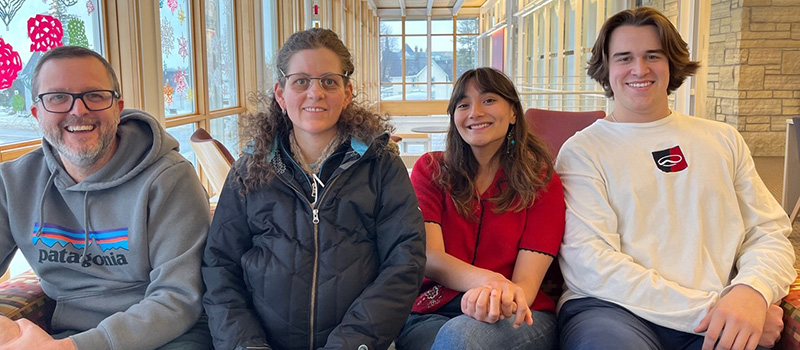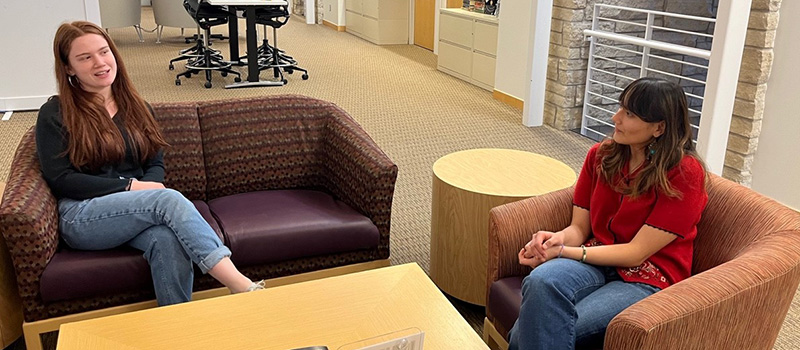Coming together to listen and learn
Jan. 29, 2024 — At a time when political division and heated discussions dominate everyday life, a successful effort to build relationships and bridge divides is underway at Grinnell College.
The Grinnell Listening Project brings together College students and community members to listen and learn from one another in small group discussions. The dialogue sessions – which are facilitated by trained community members and students – are entering year two and have a number of goals, says Ryan Solomon, associate director of civic education and innovation for the Center for Careers, Life, and Service (CLS).
“We live and interact with different people, and you have to engage with them if you want to collaborate with them,” explains Solomon, who launched the program. “This project is about building listening and dialogue skills and bringing people together. And even as we disagree with one another, we recognize each other’s humanity and have a degree of respect for one another.”
 Ryan Solomon, left, CLS associate director of civic education and innovation, is part of a group photo with community facilitator Vanessa Preast, and student facilitators, Diya Shrestha ’26 and Haden Horstman ’26.
Ryan Solomon, left, CLS associate director of civic education and innovation, is part of a group photo with community facilitator Vanessa Preast, and student facilitators, Diya Shrestha ’26 and Haden Horstman ’26.
Solomon, who hails from South Africa, initially got involved in dialogue work while earning his Ph.D. in rhetoric at the University of Wisconsin, Madison. Later as a faculty member at Colgate University, he was part of a group of faculty and staff who started an intergroup dialogue program in response to campus protests over racism.
At Grinnell, Solomon is using his partnerships in the community with local churches and other groups to ask “what can we do to build bridges here, and to listen to each other in a way that challenges our assumptions and judgements? That’s a good way for all of us to learn.”
But the Listening Project isn’t only about dialogue, he says. By building relationships, students and community groups can unite to work on different projects and initiatives. One example is the Grinnell Community Meal, sponsored by Grinnell College and the Grinnell United Methodist Church. Students and community members plan, cook, and serve the weekly dinner for those in need.
The Listening Project’s core workshop, which takes place once a week for three weeks, is called “Building Bridges Through Listening.” So far there have been sessions in spring and fall 2023 attended by more than 70 students and community members. The next workshop is scheduled for this spring.
At the first session participants get to know one another and share what defines them, their values, and life experiences. In later sessions, students talk about their interactions with the community, initial perceptions of the town and how that’s changed. Town residents discuss their experiences living in Grinnell, concerns about the role of the College in the community, and their interactions with students, among other issues.
The project is partially supported by the Ragnar Thorisson ’11 Endowed Memorial Fund for Social Justice, which sustains programs and initiatives that encourage students to learn about the world beyond the campus and effect positive social change. Thorisson, who passed away in 2016, was a respected leader and activist in the greater Grinnell community who was devoted to building a just and fair society for all.
During the past two years on National Philanthropy Day (Nov. 15), Grinnell students have made gifts to support student facilitators who are part of the Grinnell Listening Project. In addition, the class of 2023 raised funds for the project as their senior class gift. A similar effort is underway by the class of 2024.
“I am very grateful for all the support I have received from students, but I am especially grateful for the financial support of students from the senior class gift,” Solomon says. “This is a first important act of philanthropy from students who don’t have a lot of financial resources, and I am honored that they would choose to stand by the project, especially when we were in the early days of developing the project. I think it speaks to the character of our students and their desire to engage with the community.”
Grinnell Listening Project sessions take place at Drake Community Library and at local churches. There have also been several student-only listening sessions on campus, focused on ‘call-out culture’ and political polarization.
 Student facilitators Sage Gladstone ’26, left, and Diya Shrestha ’26 have enjoyed taking part in the Grinnell Listening Project.
Student facilitators Sage Gladstone ’26, left, and Diya Shrestha ’26 have enjoyed taking part in the Grinnell Listening Project.
Facilitators have enjoyed the trainings and the experience. “I’ve learned to be curious and a great listener,” says student facilitator Diya Shrestha ’26. “This is so valuable because a lot of problems are caused because of lack of listening, which leads to biases and preconceived notions.” As an international student from Nepal, Shrestha shared her experiences of being a person of color and a minority in Grinnell.
But the dialogues aren’t therapy sessions, Shrestha says. “We’re here to have a conversation and give a platform and comfortable space where people know they can be heard. We also understand that it’s an ongoing process, and when you interact with the same people over the three sessions you gradually and inevitably open up to them.” Now she says hello to familiar faces when she walks through town. “Our goal is to bridge the gap but as an individual, my goal is to have an open mind and perspective toward the community.”
Sage Gladstone ’26 says she was drawn to the project “because I knew I’d be going to school in a small rural town with a composition very different from the campus. I didn’t want to get lost in an elite academic bubble and not know the community around me.” She got a job at a local coffee shop and signed up to be a student facilitator.
“I view this dialogue project not just as a way to talk about hard things and feel good,” she says. “To me it’s way more radical than that. This is finding the thread that connects us all to our humanity. It’s a very intentional process to build that common thread, elucidate our different experiences in this very small town, and learn in what ways can we better understand each other and disarm biases, no matter your role in this community.”
Misty Poush is a community facilitator who’s lived in Grinnell for 20 years. “I saw an ad last spring to join the project as a participant, and I had such a great experience so when they asked for community facilitators, I signed up.”
Poush describes herself as a religious person. “The idea of people listening to each other is to me furthering what we were put here to do – to find common ground,” she says. “The project as a whole leads us to that common ground. Maybe I’m a little optimistic, but when you hear other people’s stories, you can’t help but hear the humanity in that.”
— by Anne Stein ’84